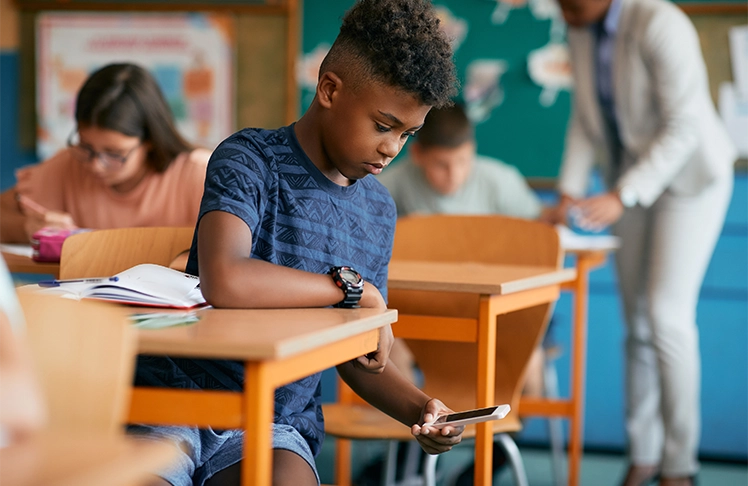
By Kiara Doyal, The Seattle Medium
When State Superintendent Chris Reykdal urged Washington school districts to crack down on in-class cell phone use last year, he wasn’t just sounding the alarm—he was echoing a national outcry from educators struggling to keep students focused. Now, a year later, most districts are taking action, with new policies rolling out this fall aimed at curbing smart device distractions during school hours.
“Our educators, parents, and families are seeing, on a daily basis, how students’ learning is disrupted—repeatedly—by their smart devices,” Reykdal said. “As an education system, we have a responsibility to protect the learning environment, removing disruptions and ensuring our policies are updated regularly to address emerging needs.”
According to a spring survey conducted by the Office of Superintendent of Public Instruction (OSPI), 75% of school districts will have a policy in place this school year limiting the use of cell phones and smartwatches during class. Of those, 53% will restrict access during instructional time only, while 31% will require devices to be put away for the entire day. Among districts with policies already in place, 61% reported that their communities are satisfied with the current approach.
Recently, researchers at the University of Washington examined how these policies are playing out in classrooms. The study, led by assistant psychology professor Lucía Magis-Weinberg, surveyed students, teachers, and parents across several Washington high schools. The results revealed that, while many expected student backlash, educators were the most enthusiastic about the restrictions—and students weren’t far behind.
“Last October, we started reaching out to districts and a few high schools in the state that were making changes to their policies,” Magis-Weinberg said. “We collected data from students, teachers, and parents on how they perceive things to be, and in general, the teachers were the happiest with the policies, and teachers prefer stricter policies.”
The student response surprised researchers. About 70% of students surveyed said the new rules had no negative effect on them, and 15% reported positive changes, including fewer distractions and improved ability to concentrate in class.
“Around 70% of the students said the policies had no impact on them, and that it didn’t make things worse, which was surprising because usually students would be more against cell phone policies,” Magis-Weinberg said. “And we had 15% of students say there are some improvements in terms of distractions in the classroom, and their capacity to pay attention and focus.”
Not all feedback was glowing. Some students said the policies increased their stress—mainly due to difficulties coordinating with parents about rides and after-school plans.
“A lot of the stress has to do with organizing logistics. We were hearing from students that they need to be in constant communication with their parents to organize pickups after school or after school activities,” Magis-Weinberg said. “So many of them told us that they need to be in contact with their parents, and they can’t do so.”
Students also raised concerns about being recorded without consent—a trend that’s reshaped how young people behave in school settings. For many, constant surveillance by peers with smartphones has become a source of anxiety.
“Growing up with that, is a lot. It changes a lot of how you behave and what you are willing to do and explore. With policies I think that allows people to be more willing to make mistakes or be goofy and we especially heard this from middle schoolers,” said Magis-Weinberg. “I think it is just a generational thing because right now, anyone can take a picture of us at any time or record us, but that has come down with the policies in place.”
Reykdal acknowledged that the digital world students inhabit presents both opportunities and challenges. While smart devices offer educational tools and social connections, he said they also bring risks.
“There are benefits to these powerful technologies, if used responsibly, but there are also tremendous risks,” Reykdal said. “Studies have found negative impacts on mental health, learning, sleep, and more. I am proud of our school district leaders who are tackling this problem head-on.”
With technology constantly evolving, many students now use devices at school for legitimate academic purposes. That’s why researchers like Magis-Weinberg stress the importance of finding balanced solutions that support learning while limiting distractions.
“I think that is raising a super important point,” she said. “Calculators, word processors, or just looking information up to do research online happens a lot. So, unless schools can provide access to the internet and to computers at school, taking away phones is really going to put some kids at a disadvantage. Having some type of technology where kids can do school-related activities is going to be key.”
Although Magis-Weinberg is not a stakeholder in policy decisions, she believes smart device restrictions can benefit students when implemented thoughtfully. As a researcher, her role is to observe, analyze, and report on educational trends rather than influence policy directly.
“One thing we have been hearing is that no one really likes the word ‘ban,’ because it has a negative connotation to it, so we say things like ‘policies’ or ‘restrictions,’” she said. “I am not really in a position to say my opinion since I am not a stakeholder, but we do hear that the policies are going to be key for youth if stakeholders are involved.”



